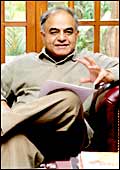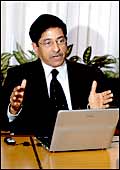 |
| Hema Ravichandar: Strategic HR challenges
excite her |
They
are a new breed of professionals. They've been there, done that,
seen it all and then decided to move on. They've been CEOs, Directors,
Presidents and Vice Presidents of large companies; many of them
have appeared on television and featured in newspaper columns;
and most had several years of corporate life ahead of them. But
they chose to give it all up and, become consultants and independent
directors on the boards of various companies.
Hema Ravichandar was Group Head and Senior
Vice President (Human Resources) at Infosys and led the global
hr function at the software giant. Her media profile was next
only to those of the founders. Yet, she resigned her position
in 2005 and started afresh as a strategic hr consultant to a handful
of clients. Why? "I first joined Infosys in 1992 as Head
of hr when it had just 250 employees. When I transitioned out
last year, that number had swelled to 40,000 worldwide. I had
a fantastic tenure at Infosys and enjoyed every moment of it;
but felt it was time to move on. HR has always been a passion
and I wanted to work on strategic hr challenges across industries.
And that's what I'm doing today."
|
The truth is that the corporate high life
(unlike that of independent consultants) is actually very
stressful
|
The motivation was different for Gurcharan
Das. He had been CEO of P&G India, Vice President of P&G
Far East, and Vice President & Managing Director of P&G
Worldwide. "But how long can an adult keep thinking of and
selling Pampers and Ariel?" he chuckles. "I was 50;
had earned enough money; the kids had grown up; and there was
no real need for me to carry on holding a regular job. So I quit."
That was in 1995. There was another reason for wanting to move
on: he had a passion for writing, which he wanted to pursue. Das
had already published three plays, one of which had won a prize
in the us, another made into a film by the BBC and a third into
a Broadway production. What does he do now? "I write full-time
and like to call myself a writer," he says, "and also
advise companies like Ranbaxy, Berger, Citibank and some others
on global corporate strategy." This last, which he calls
a part-time occupation, keeps him busy for six to seven days a
month, earns him a nice packet-"I charge my clients very
high fees," he says-and leaves him with sufficient time to
pursue his passion.
 |
 |
| Gurcharan Das: A full-time writer-cum-part-time
advisor |
Anal K. Jain: Has greater control over
routine and priorities |
All the executives BT spoke to admitted that
they opted out of the corporate rat race only after securing their
financial future. Says Ravichandar: "Infosys' tremendous
scheme of sharing wealth with employees and other stakeholders
created a safety net." She's referring to Infosys' stock
option scheme.
But does walking away from a high flying
corporate job and becoming a consultant or an independent director
involve a financial sacrifice? P.P.R. Rao, former Managing Director,
Nortel Networks India, former CEO, Wipro Infotech, and another
member of this tribe, says there are two parts to the answer.
"The rewards are comparable when you consider salary earned
to consultancy fees earned. But if you bring stock options and
other long-term benefits into the equation, then it's obviously
a lot less." Adds Anal K. Jain, former MD of Sun Microsystems
South Asia, who now runs his own consultancy firm: "It's
a trade-off. You accept the slightly lower income in return for
greater control over your routine and priorities."
| ALL YOU WANT TO KNOW |
WHO Chairmen,
Managing Directors, CEOs, COOs, Presidents and Vice Presidents
WHAT Independent directors on
the boards of various companies and/or consultants on global
strategy, mergers and acquisitions (both domestic and global),
branding, positioning, fund raising, etc.
WHY Ennui; an urge to opt out
of the corporate rat race; an urge to become one's own master;
comfortable financial position
WHEN Typically, these executives
are in the 45-55 age group
HOW MUCH Depends on the brand
equity of the individual. Star executives can earn as much
as Rs 1.5-2 lakh a day. The figure at the lower end of the
scale is about Rs 25,000 a day
HOW MANY DAYS Again depends on
the individual. But most such executives get about five to
10 days of consulting work a month |
And Rao debunks the notion that a consultant's
job is any less glamorous than that of a senior corporate executive.
"I continue to rub shoulders with Tier I executives and also
get to interact with people down the line, right down to the shop
floor supervisor. So, this job is neither less glamorous nor less
challenging. The only difference is that I now work fewer hours
than I used to."
That's one factor driving this trend. The
truth is that the so-called glamorous corporate high life is actually
very stressful. It involves travel for 10-15 days a month, 12-15
hour working days and often-impossible deadlines. Independent
consultants don't have to undergo any of this. "It's not
really a very exacting job," admits Das, "we give advice
on how to solve a problem or go about a particular issue; that's
the easy part. The implementation, which is the difficult part,
is done by someone else. A consultant is essentially a mentor
who passes on his practical experience as a corporate executive
to the next generation of managers."
 |
| P.P.R. Rao: Yes, financial sacrifice
is involved, but... |
Ravichandar adds another dimension to the
discussion. "There are many reasons why people decide to
move on. The need to do something different, to set up an initiative
or enterprise which can make a difference in a particular field
is a major decision driver. The motivation to stay 'relevant'
and not get frozen on the learning curve is another reason, I
believe, that motivates people to leave the safe cocoon of regular
jobs and get into consultancy," she says.
Das, Ravichandar, Jain, Rao and others like
them also serve on the boards of various companies as independent
directors. Ronesh Puri, Managing Director of search firm Executive
Access, thinks this trend will gain momentum. "It doesn't
pay very well. But, it doesn't matter to these people as they
have already made their money. For them, it's the prestige that
counts," he says, adding: "but as the pay increases,
more candidates will take this up as a career option."
In the meantime, they'll simply step off
the corporate fast lane to become mentors to their successors.
-additional reporting by Shaleen
Agrawal
COUNSELLING
Help, Tarun!
 I am a 26-year-old science graduate working as a Senior Sales
Assistant (Corporate Marketing) with a reputed company for the
last one year. I also have over two years' experience as a sales
executive in a construction company. Although I am comfortable
in my current job, I still wonder if sticking to the sales line
would have been a better option.
I am a 26-year-old science graduate working as a Senior Sales
Assistant (Corporate Marketing) with a reputed company for the
last one year. I also have over two years' experience as a sales
executive in a construction company. Although I am comfortable
in my current job, I still wonder if sticking to the sales line
would have been a better option.
The sales profession is quite good and there are job openings
there all the time. However, there is a distinction between a
job in actual sales and the sales support function. While the
former may sometimes be stressful in terms of having to achieve
targets, frequent travel and long working hours, the rewards and
growth opportunities are much better as compared to the latter.
I am a 40-year-old woman teaching English
in classes XI and XII. I have been in this profession for the
past 14-15 years and am now considering becoming a lecturer. I've
done BA (English Hons), MA (English) and BEd. Is it a good idea
to become a lecturer at this stage? If yes, what kind of a formal
training or course do I need to pursue?
Do you now want to teach in a college rather
than a junior college/school or are you currently teaching coaching
classes? In either case, you do have the necessary qualifications,
though there are some colleges that insist on a PHD. Also, the
curriculum (in colleges) is quite different and you will need
to familiarise yourself with it.
I have been working with a leading realtor
for the past six months. Before that, I used to work for a small
estate agency. I now regret my decision to quit, as I had more
freedom, responsibility and my work used to be appreciated. Here,
I am one among many. Please advise.
Think about your ultimate goal and do a pros
and cons analysis. It may open your eyes to things that you may
be taking for granted in your current job. If size is not an issue,
then the choice is pretty clear. But remember, all small agencies
may not be alike!
Answers to your career concerns are contributed
by Tarun Sheth (Senior Consultant) and Shilpa Sheth (Managing
Partner, US practice) of HR firm, Shilputsi Consultants. Write
to Help,Tarun! c/o Business Today, Videocon Tower, Fifth Floor,
E-1, Jhandewalan Extn., New Delhi-110055..
The
IC Quotient
It's still at a nascent stage. But this new
tool for evaluating corporate value can change the way companies
recruit fresh talent.
 |
| Bizworth's Suri: Human capital is unique |
The
trend started in the 80s. That's when analysts and accountants
noticed an increasing gap between the book value and the enterprise
value of companies. And that's when a new term was coined to identify
the key input behind this incremental value: intellectual capital
(IC). The most important component of IC is obviously people or
human capital. But IC has other intangible elements as well-internal
processes, databases and the customer relationships that form
the superstructure within which human capital operates.
Says J. Suri, Executive Vice President (Intellectual
Capital Services), Bizworth India Pvt. Ltd: "Human capital
is unique because it's the only form of capital which can never
be owned by a company; it can only be contracted. And therein
lies the challenge in maximising returns on capital employed."
Bizworth, incidentally, is the only company in the country that
measures intellectual capital.
How does it help? "On the human capital
side, IC evaluation can help companies determine the contribution
of groups of employees to its overall performance," he says,
adding: "IC, however, cannot be used to assess individuals."
IC evaluation is a long process-it takes
10-12 weeks to calculate the IC of a mid-sized company and involves
in-depth interviews with 30-40 people-two-thirds of them outsiders-on
over 300 parameters, followed by aggregation, analysis and extrapolation
of the collected data.
IC evaluation can, thus, help companies get
a handle on human capital and other intangibles-the largest components
in their enterprise value.
-Arnab Mitra
|








 I am a 26-year-old science graduate working as a Senior Sales
Assistant (Corporate Marketing) with a reputed company for the
last one year. I also have over two years' experience as a sales
executive in a construction company. Although I am comfortable
in my current job, I still wonder if sticking to the sales line
would have been a better option.
I am a 26-year-old science graduate working as a Senior Sales
Assistant (Corporate Marketing) with a reputed company for the
last one year. I also have over two years' experience as a sales
executive in a construction company. Although I am comfortable
in my current job, I still wonder if sticking to the sales line
would have been a better option. 